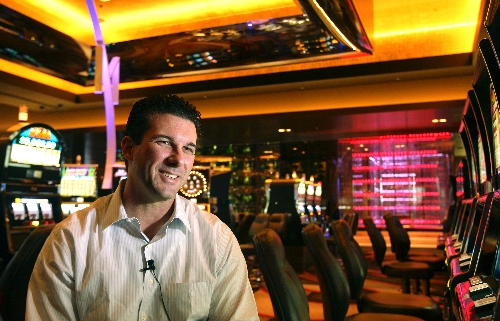M Resort’s Marnell says he opposes Internet poker legalization
M Resort President Anthony Marnell III has come out in opposition to legalizing Internet poker, becoming the second high-profile gaming executive to break ranks with the bulk of the casino industry, which is lobbying Congress to pass online poker legislation.
Marnell made his remarks during a recent interview with Nevada Newsmakers, a statewide public affairs television program. His comments echoed similar sentiments expressed last month by Las Vegas Sands Corp. Chairman Sheldon Adelson.
"I agree with him 100 percent, we're pushing this way too far," Marnell said during a segment that aired Dec. 28. The episode was taped Dec. 13, prior to the Dec. 23 U.S. Department of Justice's announcement that it has reversed a long-standing opinion that the federal Wire Act of 1961 outlawed all gambling across state lines.
Through an M Resort spokeswoman, Marnell declined Friday to make additional comments on the issue.
He told interviewer Sam Shad his opinion was his own and was not that of his employer, Penn National Gaming, which took control of M Resort last June. The regional casino operator gained ownership of the 390-room hotel casino after purchasing the property's debt at a 75 percent discount.
However, in April, Penn National executives told analysts during the company quarterly earnings conference call that they opposed efforts to legalize Internet poker even though Chairman Peter Carlino speculated legalization is probably inevitable.
"My position has long been that online gaming is a bad idea," Carlino said. "A bad idea from whole lots of social points of view. However, I say that the tide may work against us there so we are beginning to look at that very hard. (We have) got to be realistic and practical ... as much as I would like it not to occur."
A Penn National spokesman said Friday the company's position on Internet poker hasn't changed. However, comments from Penn National President Tim Wilmott in the same conference call hold true.
"We do think something down the road at the state level will eventually evolve," Wilmott said. "And we engaged discussions with a lot of different providers of Internet poker applications to assess capabilities and talents and fit with us, as we continue to explore this."
Marnell appeared on Nevada Newsmakers to discuss M Resort and the Las Vegas gaming market. When asked about Internet poker legalization, Marnell said he was concerned the activity could lead to problem gaming and gambling by minors.
"I just can't see a scenario where you can truly secure that from young children," Marnell said. "Once it becomes legalized, it's taking it too far. I think you start to create addictive behaviors in the home that we can't see as operators. We have problem gambling initiatives on the casino floor."
Marnell's views differ from the bulk of the gaming industry. Caesars Entertainment, MGM Resorts International and the industry trade group American Gaming Association have encouraged Congress to legalize Internet poker.
Several casino companies already have agreements with European online gaming operators to start U.S.-based online poker entities if the activity is legalized. In December, Nevada gaming regulators adopted rules that would allow state licensing of online poker providers after legalization at the federal level.
Some industry leaders were hopeful the Justice Department's opinion change on the Wire Act, saying it now only applies to sports wagering, would open the door for online poker legislation.
"That's just my take on it," Marnell said. "I know I'm not in favor of the gaming industry perspective. I just think enough is enough. We don't need to push this farther into the home."
Based on the history of gaming expansion, Marnell said the current push wouldn't end at online poker. If one gambling game were approved, other gaming would gain approval.
"It starts off as a bingo room, then it becomes a full blown Las Vegas casino," Marnell said. "All it takes is time, money and legislation. My opinion is online poker won't be the end of this. It will just be the beginning."
Marnell said online poker is being proposed because states and the federal government have large budget deficits. He said lawmakers need to control spending and cost structures before creating new revenue streams.
"I guess I'm trying to figure out where we are going with this long term," Marnell said. "Are we using this as a method to pay a bunch of bills because the states don't have enough money?
American Gaming Association President Frank Fahrenkopf Jr. on Friday declined comment on Marnell's remarks.
Contact reporter Howard Stutz at hstutz@reviewjournal.com or 702-477-3871. Follow @howardstutz on Twitter.

















